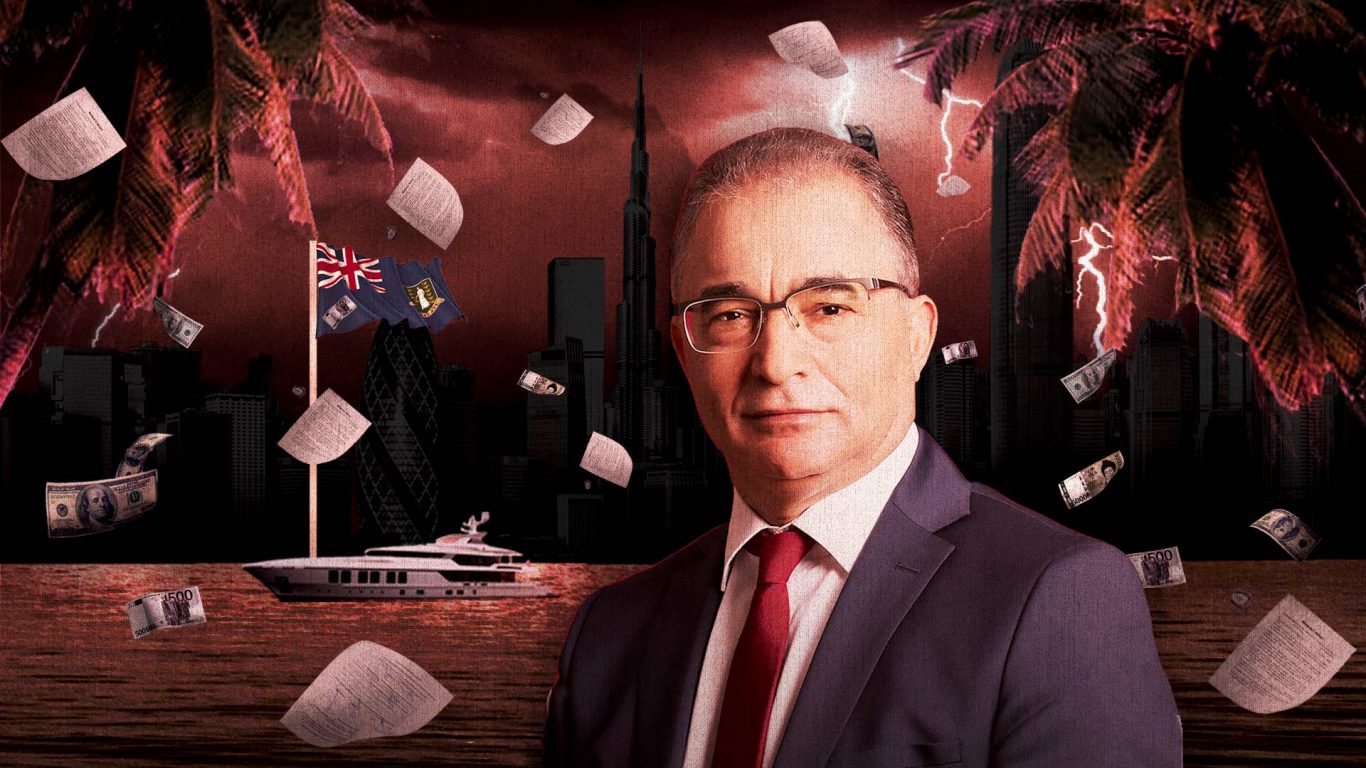The confidential documents expose offshore transactions from the King of Jordan, Vladimir Putin, the Ukranian and Kenyan Presidents, the Prime Minister of the Czech Republic, as well as former British Prime Minister Tony Blair. The files also detail the financial activities of celebrities such as Shakira and Elton John, and more than 130 billionaires from Russia, the US, Turkey and several other countries.
The Pandora Papers additionally reveal financial schemes involving Tunisians, and some anonymous individuals who used offshore companies to avoid Tunisian taxation or to accumulate wealth. One name in particular, that of politician Mohsen Marzouk, had already appeared in the Panama Papers.
The largest journalistic collaboration in history
These leaked documents became the basis for the largest journalistic collaboration in history. The investigation conducted by the International Consortium of Investigative Journalists (ICIJ) and nearly 150 partner media outlets around the world (including inkyfada), sheds light on the inner workings of tax evasion and the offshore system.
A total of 2.94 terabytes of data was shared with ICIJ by an anonymous source, without any strings or conditions attached. The International Consortium of Investigative Journalists is a non-profit news organisation based in Washington, D.C., comprised of a global network of investigative journalists, including inkyfada. the ICIJ has led several international investigations into the world of offshore finance.
The documents originate from 14 private and corporate service providers specialising in offshore finance, and reveal how these firms set up shell companies in tax havens to enable prominent public figures to avoid taxation and conceal their financial transactions.
For two years, more than 600 journalists have worked together to analyse and process these documents, sifting through information on the identity of the real beneficiaries, how these arrangements are organised, as well as digging through court records and other public documents from dozens of countries. All this with the aim of exposing the underbelly of this obscure system, and holding politicians and the wealthy accountable.
The Tunisian Part
Inkyfada was able to find several links to Tunisians, one of which had already appeared in the Panama Papers, namely Mohsen Marzouk. The latter had requested information on how to set up an offshore company with the Panamanian firm Mossack Fonseca, during the time between two presidential elections.
At the time, Marzouk vehemently denied any involvement. "I never sent a message to this company", he said on air with Mosaïque FM on April 5, 2016, the day after the article was published. "Those who claimed this will assume their responsibility before the law", he added, threatening to file a complaint against inkyfada.
This time however, the data obtained through the Pandora Papers prove that Mohsen Marzouk did indeed go through with his project.
Thanks to another firm, he was able to establish the company Eagle One Investments Holdings Limited in the British Virgin Islands, known to be the number one tax haven. This time, when contacted by inkyfada, Mohsen Marzouk admitted to having had contact with Mossack Fonseca, contrary to what he had claimed in 2016. The details of this arrangement are already available on inkyfada.
Thanks to another firm, he was able to establish the company Eagle One Investments Holdings Limited in the British Virgin Islands, known to be the number one tax haven. This time, when contacted by inkyfada, Mohsen Marzouk admitted to having had contact with Mossack Fonseca, contrary to what he had claimed in 2016. The details of this arrangement are already available on inkyfada.
On the same subject
There are also other Tunisians that have used the services of these firms establishing offshore companies. Some of these were seeking to avoid high taxation, whilst others used shell companies in order to acquire yachts or private jets, far away from taxation, or to incorporate their jewellery businesses. Many have used these obscure arrangements for their import-export activities.
This was for example the case of "O.H.", who lives in a town about forty kilometres outside of Tunis, acting as an intermediary specialising in import-export with Libyan traders in the agricultural food sector. To do this, she established a company that exports exclusively to Tunisia. The advantage: she was not required to pay taxes for ten years. However, once this period expired, she had to pay 10% tax. O.H. admits half-heartedly that "even if it's not much", she prefers to not to pay taxes at all.
As the deadline approached, O.H. was on her way to an event in Dubai when she was approached by a salesman from SFM. This man had a solution to avoid Tunisian taxation: setting up a company in a tax haven that would allow her to open a bank account abroad and continue her business in the same way without being taxed.
But with increasingly restrictive regulations, and countries being forced to be more transparent due to international pressure, things did not go according to plan, and she was unable to open the bank account. The details of her story will be available on inkyfada very soon.
Another individual, the head of a large textile company from a family of businessmen, used a firm involved in the leak. This time, the arrangement was used to obtain a recreational yacht.
Inkyfada also had access to documents relating to a man who claimed to be the main client of Kaloti, a major gold trader and refiner. An ICIJ investigation revealed that more than $9 billion (USD) of Kaloti's transactions were reported by banking and financial institutions to the US Treasury between August 2007 and June 2015.
This Tunisian man is said to own companies in sectors linked to raw materials, jewellery or specialised in the acquisition of recreational boats and private jets. On the registration form for an account with a Hong Kong bank that has already been found guilty of money laundering (and which is currently in receivership), he estimates his turnover to be 150 million dollars.
The Virgin Islands, Hong Kong, and many other jurisdictions considered as tax havens, are at the heart of the Pandora Papers: "These are territories that are free to conduct dubious transactions in, because it ranges from outright criminality to white-collar [delinquents]", comments public law professor Neila Chaâbane. Several of these stories will be unravelled and available on inkyfada very soon.
Over 330 politicians and officials identified
The Pandora Papers collected information on more than 27,000 companies. Behind these entities, 29,000 beneficiaries were identified, more than double the number that were identified via the Panama Papers. The latest ICIJ investigation identifies more than 330 politicians and officials from over 90 countries and territories, including 35 current and former world leaders.
By tracing the documents, some journalists were able to identify murky stories linked to prominent politicians. The Washington Post reveals how a $4 million apartment in Monaco was obtained by a St Petersburg woman, after she gave birth to a child whose father is believed to be Russian President Vladimir Putin.
Prominent figures in the Middle East and Africa
Amongst the individuals identified in the Pandora Papers as nationals of North Africa and the Middle East, nearly forty of them are political actors. Within the Maghreb alone, in addition to Mohsen Marzouk, the investigation identified two Moroccan nationals, a former parliamentarian and a former minister of tourism, a close advisor to King Mohamed VI.
In the east, in Jordan, the documents reveal that the King of Jordan, Abdullah II, secretly acquired 14 luxury houses in Great Britain and the United States through shell companies registered in tax havens. Their total value exceeds $106 million, with the property investments starting in 2003, four years after his coronation.
The King of Jordan is linked to a network of 36 offshore companies based in the British Virgin Islands and Panama, and set up by the law firm Alcogal, one of the 14 firms whose documents were leaked. Some of these enabled the investments to be made whilst concealing the real beneficiary, to whom Alcogal would refer to under the pseudonym 'You know who'. The same Panamanian firm also incorporated Mohsen Marzouk's company Eagle One Investments Holdings Limited, also based in the British Virgin Islands.
According to the leaked documents, the majority of these purchases were made between 2011 and 2017, at a time when the Hashemite kingdom experienced several episodes of protests against unemployment, falling purchasing power, austerity and corruption. On July 13, 2020, Jordanian Prime Minister Omar al-Razzaz promised to intensify the crackdown on tax evasion, adding that it has deprived the country's cash-strapped economy of billions of dollars in revenue in recent years, Reuters reports. The two former Jordanian prime ministers, Abdelkarim A. S. Kabariti and Nader Dahabi, as well as senator Haifa Hajjar Najjar, are also mentioned in the Pandora Papers.
As for Lebanon, there are six prominent politicians mentioned in the Pandora Papers, including the current president of the Council of Ministers Najib Mikati, whose fortune was estimated by Forbes in March 2021 at $2.9 billion. According to the minutes from a board meeting for 'Hessville Investment INC' in February 2008, Mikati is the shareholder and director of said company, which is under Panamanian jurisdiction. This meeting took place "in order to authorise the purchase of a property in Monaco for a price not exceeding 7 million euros".
Also mentioned is Hassan Diab, the former President of the Council of Ministers (January 2020 - September 2021), and Riad Salameh, the Governor of the Central Bank of Lebanon, who is under investigation in France for money laundering, as well as three other businessmen and politicians.
However, the majority of officials involved in the region can be found in the Persian Gulf. Amongst these 23 personalities are the Emir of Qatar Tamim Al Thani, who is a shareholder in LND Estates Limited (a London-based real estate holding company), the Emir of Dubai and Prime Minister of the United Arab Emirates Mohammed Ben Rashid, as well as the former Emir of Kuwait Sheikh Sabah al-Ahmad al-Sabah, who passed away in September 2020. Alongside them we find several current and former senior officials.
On the African continent, the Pandora Papers identified 49 politicians. The President of the People's Republic of Congo Denis Sassou-Nguesso, the President of Gabon Ali Bongo, the President of Kenya Uhuru Kenyatta, and the Prime Minister of Côte d'Ivoire Patrick Achi are found amongst the millions of documents reviewed.
Another dive into the obscure world of tax havens
The Pandora Papers investigation uncovers the hidden owners of offshore companies, bank accounts, private jets, yachts, mansions and even artworks by artists such as Picasso, and Banksy - providing deeper insight than is typically available to law enforcement or governments.
The information in the Pandora Papers originates from 14 service providers operating in at least 38 different jurisdictions.
The files include an unprecedented amount of information on the "real beneficiaries" of companies that are registered in the British Virgin Islands, Seychelles, Hong Kong, Belize, Panama, South Dakota and other jurisdictions, as well as information on shareholders, directors and managers. Apart from the wealthy individuals (famous or infamous for their criminal activities), many of the people exposed through this leak are anonymous individuals who do not represent any public interest, and who are seemingly small business owners, doctors and others wishing to evade taxes in their country of residence.
–
The Pandora Papers are the result of a global collaboration between the non-profit International Consortium of Investigative Journalists (ICIJ) and more than 150 media outlets around the world. If you would like to support quality investigative journalism, you can contribute by making either a one-off or regular donation to the ICIJ here.





